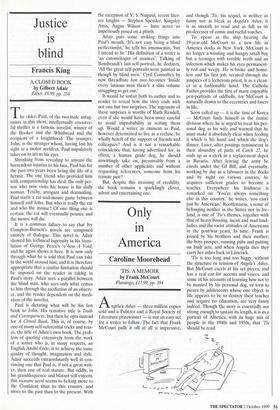Justice is blind
Francis King
A CLOSED BOOK by Gilbert Adair Faber, 0.99, pp. 258
The older, Paul, of the two male antag- onists in this short, intellectually resource- ful thriller is a famous novelist, winner of the Booker and the Whitbread and the recipient of a knighthood. The younger, John, is the stranger whom, having lost his sight in a motor accident, Paul impulsively takes on to act as his eyes.
Shrinking from revealing to anyone the horrendous injuries to his face, Paul has for the past two years been living the life of a hermit. The one friend who provided him with companionship has died; the only per- son who now visits his house is his daily woman. Tetchy, arrogant and demanding, Paul starts a cat-and-mouse game between himself and John. But who is really the cat and who the mouse? Of one thing one is certain: the cat will eventually pounce and the mouse will die.
It is a common fallacy to say that Ivy Compton-Burnett's novels are composed entirely of dialogue. This novel is. Adair showed his technical ingenuity in his trans- lation of George Perec's `e'-less A Void, and he again shows it here. It is now only through what he is told that Paul can take in the world around him; and it is therefore appropriate that a similar limitation should be imposed on the reader in taking in Paul's story. Adair sees a parallel between the blind man, who sees only what comes to him through the mediation of an observ- er, and the reader dependent on the medi- ation of the novelist.
Paul is dictating what will be his last book to John. His tentative title is Truth and Consequences, but then he opts instead for A Closed Book. This is, of course, by one of many self-referential tricks and teas- es, the title of Adair's own book. The prob- lem of quoting extensively from the work of a writer who is, in many respects, an English Andre Gide, is to achieve the same quality of thought, imagination and style. Adair succeeds extraordinarily well in con- vincing one that Paul is, if not a great writ- er, then one of real stature. But oddly, in his grandiloquence and blatant self-esteem, this monstre sacri seems to belong more to the Continent than to this country, and more to the past than to the present. With
the exception of V. S. Naipaul, recent liter- ary knights — Stephen Spender, Kingsley Amis, Angus Wilson — have never so imperiously posed on a plinth.
Adair puts some striking things into Paul's mouth. 'It's not easy being a blind perfectionist,' he tells his amanuensis, 'but I intend to be.' His definition of a writer is 'an entomologist of nuances'. Talking of Rembrandt's last self-portrait, he declares, 'All the great self-portraits were painted as though by blind men.' Cyril Connolly's by now threadbare bon mot becomes 'Inside every fatuous man there's a slim volume struggling to get out.'
It would be unfair both to author and to reader to reveal how the story ends with not one but two surprises. The ingenuity of these surprises is worthy of Ruth Rendell, even if she would have been more careful to avoid improbability in setting them up. Would a writer as eminent as Paul, however determined to live as a recluse, be wholly bereft of the support of friends and colleagues? And is it not a remarkable coincidence that, having advertised for, in effect, a human guide dog, he should unwittingly take on, presumably from a number of other applicants and without requesting references, someone from his remote past?
But, despite this straining of credulity, the book remains a sparklingly clever, adroit and entertaining one.










































































 Previous page
Previous page